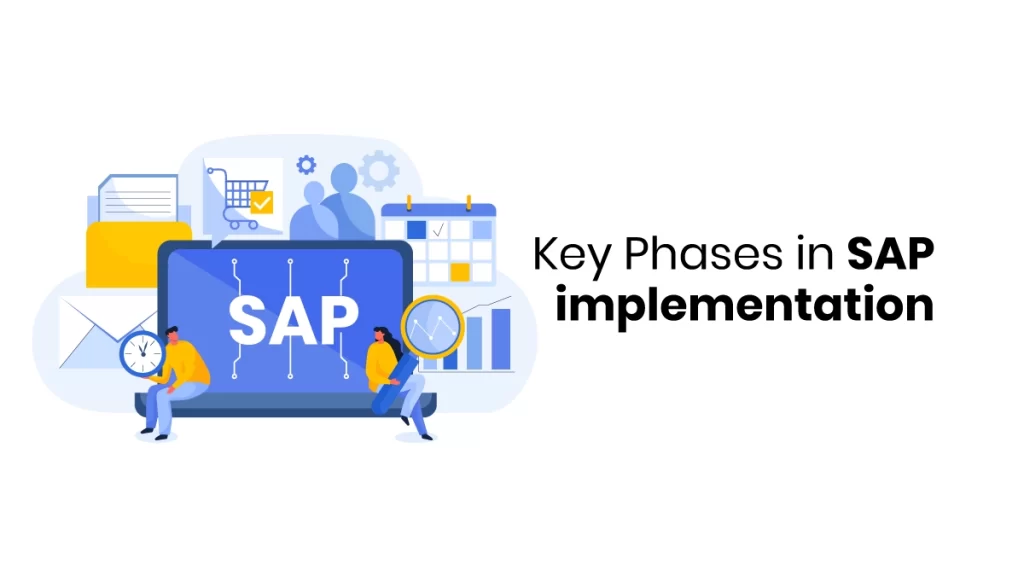SAP applications are the backbone of every business, so CIOs and owners work hard to ensure that the implementation of SAP goes well. But even with all the effort, it often doesn’t work out – they say it’s a 50-50 chance of success. That’s because many businesses don’t start the right way. For companies to make SAP work, it’s super important to think carefully, plan well, and follow the critical steps in the process. It doesn’t matter if it’s SAP S/4HANA, SAP ERP, or another SAP system – the essential stages are the same for all Phases in SAP implementation. Going through these stages properly makes it more likely for the SAP implementation phases to be a success, and that’s crucial for the business’s long-term success.
7 Key Phases in SAP implementation
The Accelerated SAP (ASAP) methodology is a standard approach for preparing and implementing SAP projects. Adhering to this method allows for the efficient optimization of time, cost, and quality, expediting the process of implementing SAP ERP. The Phases in SAP implementation journey comprises seven crucial stages within this methodology.
1. Project Kickoff and Planning
In the initial phase of your SAP implementation journey, the critical focus is project preparation and planning. This stage, if not approached correctly, can lead to project failure. The complexity of this phase arises from the need to consider various details and factors within the expansive project landscape. Opting for a reliable SAP implementation partner, such as an SAP Managed Service Provider (MSP), becomes crucial at this point. These experts play a pivotal role in crafting an efficient SAP roadmap.
First, clearly outline your requirements to the SAP implementation company and articulate your objectives, scope, and priorities. Collaborate with the MSP to choose the most suitable tools and approaches that align with your needs. Once these decisions are made, identify the operations that will be migrated to SAP or modernized.
This stage also involves essential activities such as project and resource planning, studying the current system (as-is), and ensuring a seamless transition to SAP ERP to maintain uninterrupted business operations. Planning for minimal downtime during implementation is critical to ensuring business continuity.
2. Business Blueprinting
Before diving into the ERP implementation process, it’s crucial to understand your future business processes. Recognizing the potential gaps between your current and future operations is inevitable. A comprehensive blueprint document addresses these variances and ensures a smooth SAP project plan.
During these blueprinting sessions, your SAP implementation partner will meticulously analyze gaps, aligning current and future SAP processes. This phase involves identifying the organizational structure, including fundamental details crucial for a successful SAP implementation. Organizational structure changes encompass the customization of basic information necessary for the SAP software to function effectively.
Additionally, a list of satellites, which includes programs not requiring modification but remaining in use post-implementation, is established.
3. System Realization/Implementation
After completing the gap analysis, your SAP implementation partner configures the baseline system and configuration. The ERP implementation project plan refines this system to meet all your business and process requirements, addressing any gaps identified in the business blueprint for a seamless SAP implementation. The SAP implementation team also handles any necessary customizations during this phase. The conversion of non-productive systems and integration of current infrastructure with ERP implementation processes occur in this stage.

4. Testing and Integration Validation
Simultaneously with the Realization phase, testing becomes pivotal during migration and implementation. The ERP implementation progresses through various testing stages, including Unit and Integration tests, to evaluate the effectiveness of the implementation and verify the delivery of results from SAP systems.
The integration testing phase is segmented into multiple setups. Initial setups may involve migrating and testing half of the current processes, followed by testing an entire process after SAP implementation in the landscape. Ultimately, the whole process and workload undergo comprehensive testing.
5. Pre-Launch Preparations
In this Phases in SAP implementation, aptly named “Preparation,” activities are undertaken to ready both systems and personnel before the system goes live. Depending on the outcomes of the Realization and testing phases, adjustments may be made in the ERP implementation methodology to ensure a seamless migration to SAP systems.
Employees are trained to perform their daily tasks using SAP and ERP software. This stage serves as a final check before going live, ensuring everything is in order and ready for a smooth transition.
6. Go-Live
In this stage, the transition from a pre-production to a live environment occurs, involving migrating all data to the SAP systems in the production environment. Once the data migration is finalized, the former systems are discontinued. Project managers, in addition to overseeing data migration and the adoption of new applications, conduct regular tests to verify the smooth functioning of all processes.
Continuous monitoring and performance optimization of SAP systems are integral during this phase. Furthermore, establishing the production support system for ERP implementation project planning is completed at this stage.
7. Production/Go-Live Support
This Phases in SAP implementation involves establishing a dedicated support team and the seamless handover from the implementation team. The support team is responsible for constant monitoring and resolution of any production issues that may arise. Additionally, they assist users, including root users, in acclimating to SAP systems and applications as needed. To ensure operational efficiency, comprehensive support documents are generated and maintained.
By adhering to these seven crucial stages in SAP implementation, you can streamline the process and minimize the overall cost of implementation. Enhanced quality management and governance make all your business objectives possible. Enrolling in an online course on SAP is crucial for mastering SAP and acquiring comprehensive industry knowledge. Finprov, a distinguished ed-tech institute, offers a variety of accounting courses, including the SAP S/4HANA courses to the learners.
Our program is thoughtfully designed to provide the flexibility of both online and offline learning options. With a team of experienced instructors, interactive sessions, and round-the-clock mentorship, Finprov is committed to empowering learners to apply SAP concepts to real-world situations seamlessly.
Tailored specifically for finance and accounting professionals aiming for career advancement, our courses offer hands-on training, leading to an SAP S/4HANA FI certification upon successful completion. Join Finprov Learning and embark on a transformative journey that expands your knowledge, positioning you for unparalleled success in the ever-evolving field of accounting and finance.










